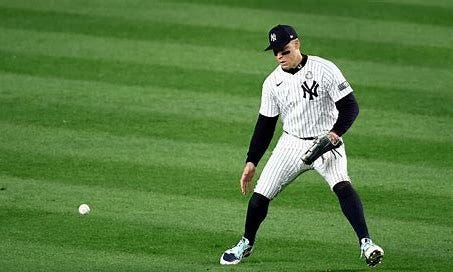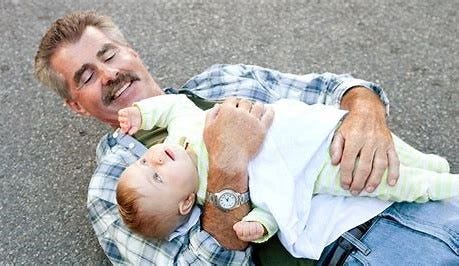One of the more surprising recent sports moments was when Aaron Judge, unanimous 2024 A.L. MVP after one of the all-time regular seasons, muffed a routine fly ball to kick off the murderous 6th inning that doomed the Yankees’ World Series hopes. As one does after an athlete screws up, I watched Judge’s face to see how he’d handle it. Would his teammates in the dugout clap his back encouragingly, or avoid eye contact?
TV commentators love to explore the emotional impact of unforced errors, saying things like, “McIlroy hasn’t been the same since that missed putt on 16.” It’s fun to think that elite athletes are just like you and me, susceptible to the yips. I’m skeptical that this is ever true with the top pros, but I’m positive that whatever Aaron Judge did in that game after the 6th inning was independent of the error. If he’d hit a home run in the 7th, they’d have said, “What heart!”1 But he’d just have been doing what he does a large percentage of the time: slugging.
My late ex-partner Brom Keifetz, who was also a successful sports bettor, used to mock the baseball cliché of the “clutch hitter.” Brom’s betting models, which he learned to create first as a horse race handicapper for the legendary Sheets, then honed at UCLA Business School, were statistical and emotionless. He loved nothing more than to push money in against a sentimentally favored but statistically inferior team. Brom at one time was the largest bettor on U.S. pro hockey; he also got involved in other less heavily bet on sports (so not pro football or basketball) where he “had an opinion,” including golf, both men’s and ladies’, boxing, and cricket.2
Anyway, about clutch hitters, he’d say, these guys have been doing the same thing every day since they were little kids and now they’re the world’s best at it. They have baseballs coming in at 100 miles an hour and their reflexes react in milliseconds. You can yell at them from the bleachers, “Charge!” but, to quote Brom, “How would they ‘Charge,’ even if they wanted to?”
If this is true, then one of the most reliable things you can bet on in sports is reversion to the mean.3 If Brom’s hockey model told him that the Toronto Maple Leafs were a two-goal favorite over the Boston Bruins, but the odds were better for him because the Bruins had been on a “hot” streak lately, that was an edge he could make money on. Even more so if the wrongly favored side is from a city full of team-fanatic knuckleheads. Like Boston.
How to Stay in the Game
I couldn’t stop thinking about Aaron Judge, whose 2024 may wind up remembered less for his MVP performance than for one bad moment in one game. Bill Buckner had a long career with almost 3,000 hits yet is best known for his error in the 1986 NLCS (though it did get him into a Curb Your Enthusiasm that Rolling Stone rates one of the 100 best TV episodes of all time).4
Maybe I felt for Judge so strongly because my investment team and I have tried to maintain high quality for many years but have also made a couple of mistakes as costly as Judge’s error. In fact, when you manage money professionally, not a day goes by when you haven’t erred in some way. You didn’t sell a stock, and it went down; or you sold one that went up; or you bought one that went up, but you didn’t buy enough; or one you were thinking about buying, but didn’t, skyrocketed …. You get the idea.
So, the professional investor is never content, and often miserable, yet must shake off his mistakes and get back in the game daily. At least stock markets close on weekends, allowing managers to get their heads together, while currencies and crypto never stop trading — a horrible thought.5 It’s not surprising that fund management has such a high burnout rate — or so it seems to me, as no one I know personally who started out when I did in the mid-90s is still running outside money.
For Aaron Judge, whose hitting relies on split second reflexes, getting back in the game after an error seems easy enough. The rest of us are more like Rory McIlroy, for whom a rattled mental state can affect swing mechanics temporarily. If a fund manager has made a couple of bad recent investments, he can lose confidence in his ability and change his style — a mechanical problem. (This applies to any decision-maker in any profession.) But like a top athlete, he keeps faith in his talent, assesses what’s gone wrong, and fixes it.
The key is an optimistic outlook. When an optimist makes a mistake, he says, “How did I screw up like that? I’ll do better next time.” While the pessimist says, “I actually suck, and this just proves it.” It’s the optimists who stay in the game. They are the ones in any field who eventually build things, while the pessimists have long ago quit and worked out who was to blame, besides themselves. In investing, even successful bears must be optimistic — about their own skills, at least.
A Wager
To anyone who believes there is such a thing as a clutch hitter or the opposite and that Aaron Judge chokes in big games, I offer this proposition in Brom’s memory. The next time Judge plays in the post-season, we will make a little over/under bet on his hitting performance, with me taking the over.
Dodger pitcher Walker Buehler did come back from a bad, error-filled inning and dugout meltdown during the N.L. Championship and the commentators went into paroxysms over his “heart”, one of them hyperbolizing that it was among the most amazing recoveries he’d ever seen in sports.
Back in the 00’s, Brom offered an opinion that Tiger Woods was statistically the greatest athlete in any sport since Babe Ruth. I wonder how his baseball model would have dealt with Shohei Ohtani.
Mean reversion, and our tendency to underestimate its power, is a core principle in the field of behavioral finance, written about most famously by Kahneman and Tversky. One experiment in the Israeli Air Force showed that instructors overestimated the effect of their praise or punishment after an especially good or bad flight, and the trainee was more likely to regress to their average level regardless of the feedback.
The episode also features my childhood friend Robert Smigel, aka Triumph the Insult Comic Dog, as softball team captain Yari. Yari (in Triumph’s voice) accuses Larry David of “Bucknering” him when he allows a ball through his legs.
That said, I’m writing this on Thanksgiving weekend and big things are happening in my Eastern European markets, where they don’t know from this holiday.






Rejecting the clutch factor assumes the importance of the moment does not impact a player’s performance. It’s a common assumption among quantitatively minded observers who, importantly, never played organized competitive sports. Maybe a pro athlete exists who shares your skepticism, but I have yet to meet them. Every athlete I know, including a handful of professionals, believes the moment has a big impact on performance: it’s why they revere MJ, Joe Montana and Tiger Woods and pity James Harden, Greg Norman and Ben Simmons. Looking at Judge, his .205 ba in 58 playoff games appears to be more than variance. The drop off in post season offensive production compared to the regular season is significant and enduring— if you bet on post season mean reversion you would have lost 5 consecutive times. If that’s too small a sample I’d like someone to define at what point it becomes large enough to conclude what’s already obvious to those experienced pressure in sports.